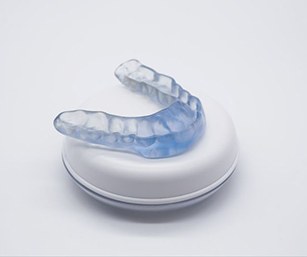Do you often suffer from symptoms like jaw pain, difficulty chewing, and headaches? If so, it is possible that you have TMJ disorder (TMD). This condition can seriously affect your quality of life! Fortunately, a number of minimally invasive TMJ treatment options are available. In our Sparta practice, for example, we aim to help patients find relief through custom occlusal splints and minor occlusal adjustments. Continue reading below to learn more about how we may be able to assist you, or contact us directly to request a consultation.
TMJ Treatment Sparta
Find Lasting Jaw Pain Relief

Why Choose Gentle Dentistry Sparta for TMJ Treatment?
- Minimally Invasive Treatment Options
- Highly Skilled Dental Team
- Multiple Payment Options Accepted
What Is TMJ Disorder?

You have two temporomandibular joints (TMJs), which are the hinges located just in front of your ears. They are responsible for controlling movements of your lower jaw. When these joints become damaged, inflamed, or irritated, a wide variety of symptoms can result. TMJ disorder may come about because of an injury, arthritis, stress, a misaligned bite, or a variety of other circumstances. Patients of virtually any age or background can develop it.
Symptoms of TMJ Disorder

TMD is associated with dozens of different symptoms, some of the most common of which include:
- Persistent jaw pain or tenderness
- Difficulty or discomfort while chewing
- Frequent headaches or facial aches
- Migraines
- Clicking, popping, or grating sounds when moving the jaw
- Limited ability to open or close the mouth
- Pain around the ears or temples
- Jaw locking or sticking in position
- Swelling on the side of the face
- Neck and shoulder pain related to jaw dysfunction
- Back pain
Types of TMJ Treatment

There are a few different ways to address TMD. When you visit us for a consultation, we will thoroughly examine your mouth and TMJs before recommending your next steps. We may advise you to start trying some home remedies, such as dietary changes or heat/ice therapy. In addition, we are likely to recommend professional therapy, which might involve the use of an occlusal splint or an occlusal adjustment.
Occlusal Splint

An occlusal splint is a custom-made oral appliance that is typically worn at night. It prevents teeth grinding, which is a common contributor to TMD. It also slightly repositions the jaw, which can help to relieve stress on your TMJs. With consistent use, many people find that an occlusal splint provides powerful and lasting symptom relief.
Equilibration/Occlusal Adjustment

If your upper and lower teeth are not working harmoniously together, it can contribute to TMD symptoms. Equilibration, also called occlusal adjustment, is a minor procedure wherein we make slight alterations to the surfaces of your teeth and/or crowns with the goal of creating a better bite. Successful equilibration can relieve stress on your TMJs and the surrounding tissues.
